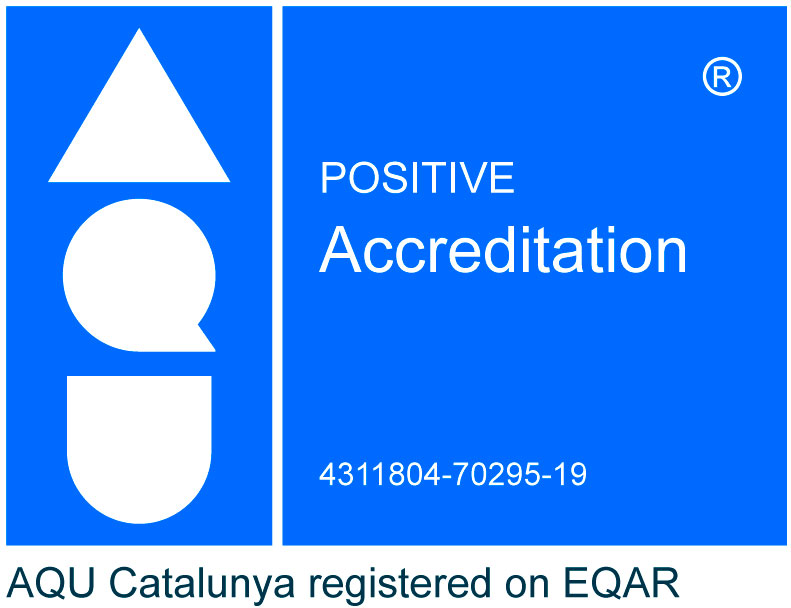University Master's Degree in Arts and Cultural Management - Official
More than 20 years of educational experience in the field of cultural management
The Master's Degree in Cultural Management at UIC Barcelona has a practical approach and a broad international perspective. Its academic programme provides students with the specific skills and competencies necessary to thrive in the field of cultural management.
Boost your career in the cultural sector
The Master's Degree in Cultural Management at UIC Barcelona is designed to equip students with the practical knowledge necessary to develop careers as cultural managers and managers in various organisations within the cultural and creative industries. Furthermore, it prepares students to take on leadership roles in a constantly evolving sector.
Over the course of the programme, students acquire the skills to create and manage their own cultural projects. Its content, structure and teaching methodologies focus on transferability and practical application, ensuring that students can translate what they have learned into a professional context.
Accredited Master’s Degree
This Master's degree is an official postgraduate qualification which has been adapted to the European Higher Education Area regulations, with evaluation carried out by the Catalan University Quality Assurance Agency (AQU Catalunya) and National Agency for Quality Assessment and Accreditation (ANECA). As an official degree, you will also have the chance to initiate a research project and develop it into a dissertation to kick-start your academic career.
Competencies
At the end of the master's degree programme, students who take this University Master's Degree in Arts and Cultural Management will be able to:
- Offer an informed discussion about the theory of culture in the 21st century and its social effects.
- Distinguish the characteristic features of local, national and international cultural policies.
- Analyse the cultural fabric of a society and formulate diagnoses that identify its needs and opportunities.
- Design, programme, manage and evaluate cultural projects.
- Create, manage and lead interdisciplinary teams.
- Manage and gather economic resources within the scope of projects, companies and cultural institutions.
- Propose marketing and communication strategies in the field of culture.
- Know and apply new technologies in the process of cultural management, production and dissemination.
- Strengthen the sense of social responsibility and ethical commitment.
Teaching Team
Each year our international faculty is made up of more than 60 lecturers and invited experts from various countries such as Canada, China, Colombia, Egypt, Germany, Ireland, Italy, Mexico, Peru, Spain, Turkey and the United States, among others. Their academic background and direct contact with professional practice allows them to offer students a multidisciplinary and multicultural perspective of the reality of the sector.
Students
The Master's Degree in Cultural Management offers the unique experience of an intensive exchange between students from different countries and continents and from different cultures, languages and religions. For the degree, culture comes to life in exchange and through communication. Cultural exchange is not just an academic objective, but a daily reality for each and every student in the classroom and at our Barcelona Campus. This is proven by the more than 900 alums from over 80 different countries that we have trained as cultural managers over the last 20 years.
Professional visits and master classes
Throughout the academic year, we offer a range of study visits to institutions, businesses and cultural organisations in the city, where students can learn in situ and first-hand from the people running them.
As a complement to the academic programme, students also have the chance to attend masterclasses given by professionals from prestigious national and international cultural institutions, and to discuss with the speakers the realities of working in the institutions they manage.
Practices
Internships in companies, institutions or cultural entities are part of the syllabus of the Master's Degree in Cultural Management. The degree has an extensive network of more than 500 active agreements, with prominent institutions in the cultural sector.

Moreover, students on the Master's Degree in Cultural Management can access the ERASMUS+ programme, managed by the UIC Barcelona International Relations Service, and apply for financial support to undertake an internship abroad.
Training 100% face-to-face, with two specialization itineraries
The Master's Degree in Cultural Management from UIC Barcelona offers two specialisation pathways: Management of Visual Arts and Cultural Heritage and Management of Cultural and Creative Industries.
A truly international programme with students from more than 80 nationalities
This master's programme is designed especially for young graduates who want to train as cultural managers at a global level, as well as for working professionals with several years of experience who want to hone their skills and improve their management processes and methods.
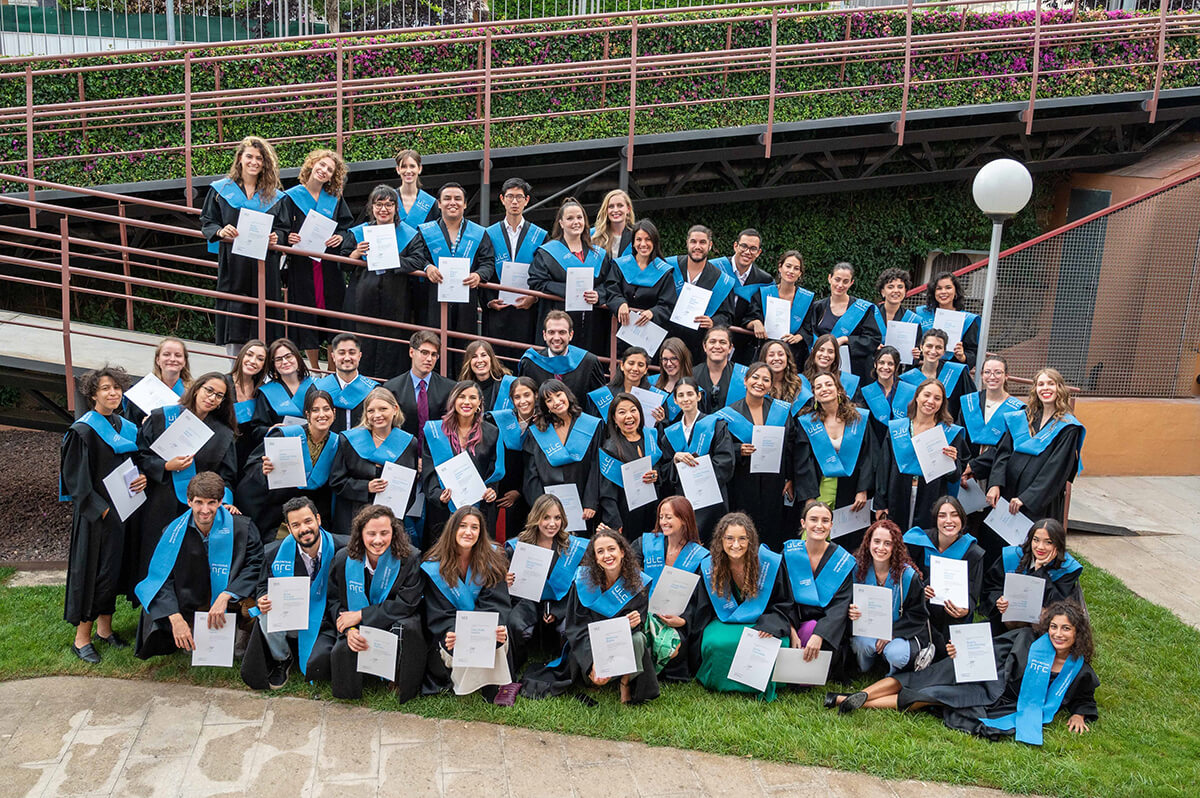
More than 900 professionals already make up the Alumni community of the Master's Degree in Cultural Management
Access the UIC Barcelona Alumni Ambassadors programme and ask your questions to UIC Barcelona graduates.
Continue your training experience abroad
Access a double degree in the United States
The Master's Degree in Cultural Management from UIC Barcelona provides you with the opportunity to earn a double degree thanks to the agreement established with the Master's Degree in Science in Arts Administration from the University of Boston. A programme through which you can broaden your knowledge and professional horizons by benefiting from the network of contacts and opportunities offered by a top American university.

Participate in an international academic exchange
At UIC Barcelona, we encourage the exchange and transfer of knowledge as fundamental pillars of a comprehensive education. Thanks to our network of international agreements, we offer our students the chance to carry out academic and research exchanges at prestigious institutions across America, Asia and Europe.
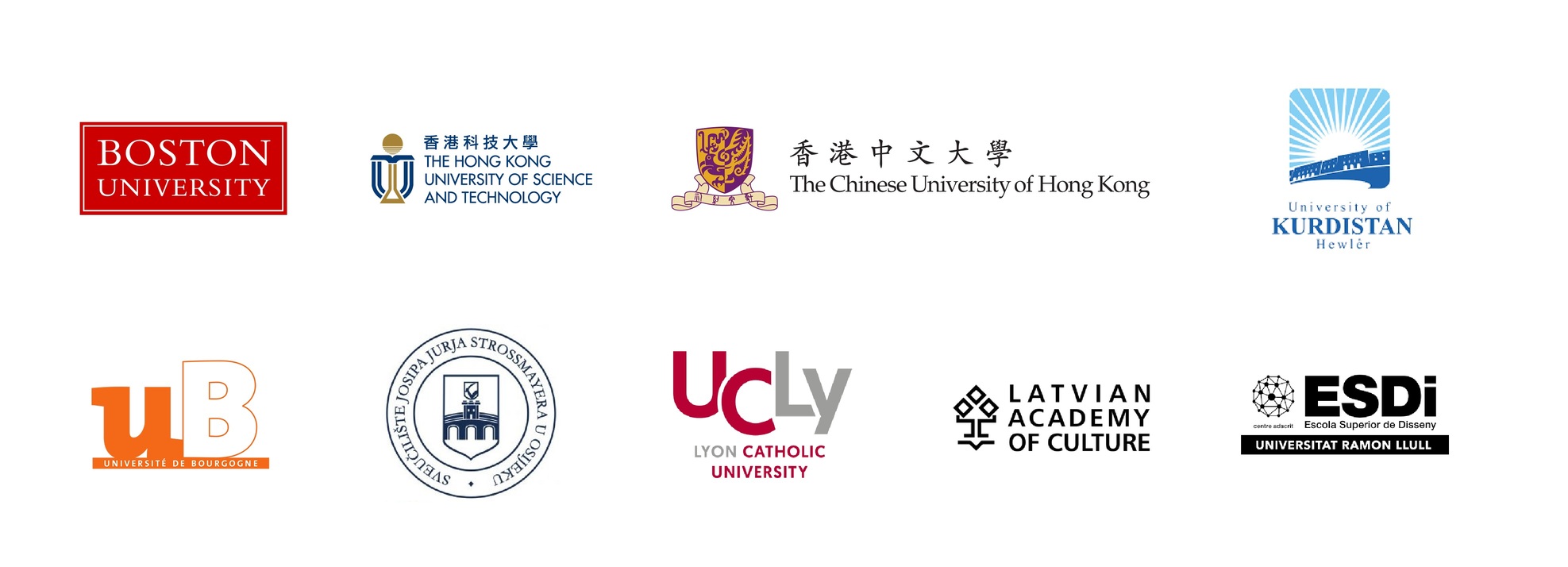
Extension of studies in Hong Kong
If you are interested in exploring the dynamic Asian cultural landscape, you can choose to do a study extension in Hong Kong. The UIC Barcelona Master's Degree in Cultural Management, in collaboration with the prestigious Chinese University of Hong Kong, offers you a unique immersion in one of the world's most vibrant and cosmopolitan cities, where tradition and modernity meet, making it the ideal environment for studying cultural management in a global context.

Cultural Management Residency Program of the master's degree in Arts and Cultural Management, in collaboration with Fabra i Coats
The master's degree in Cultural Management at UIC Barcelona offers its Alumni community the opportunity to access a cultural management residency at Fabra i Coats, Barcelona's Creation Factory.
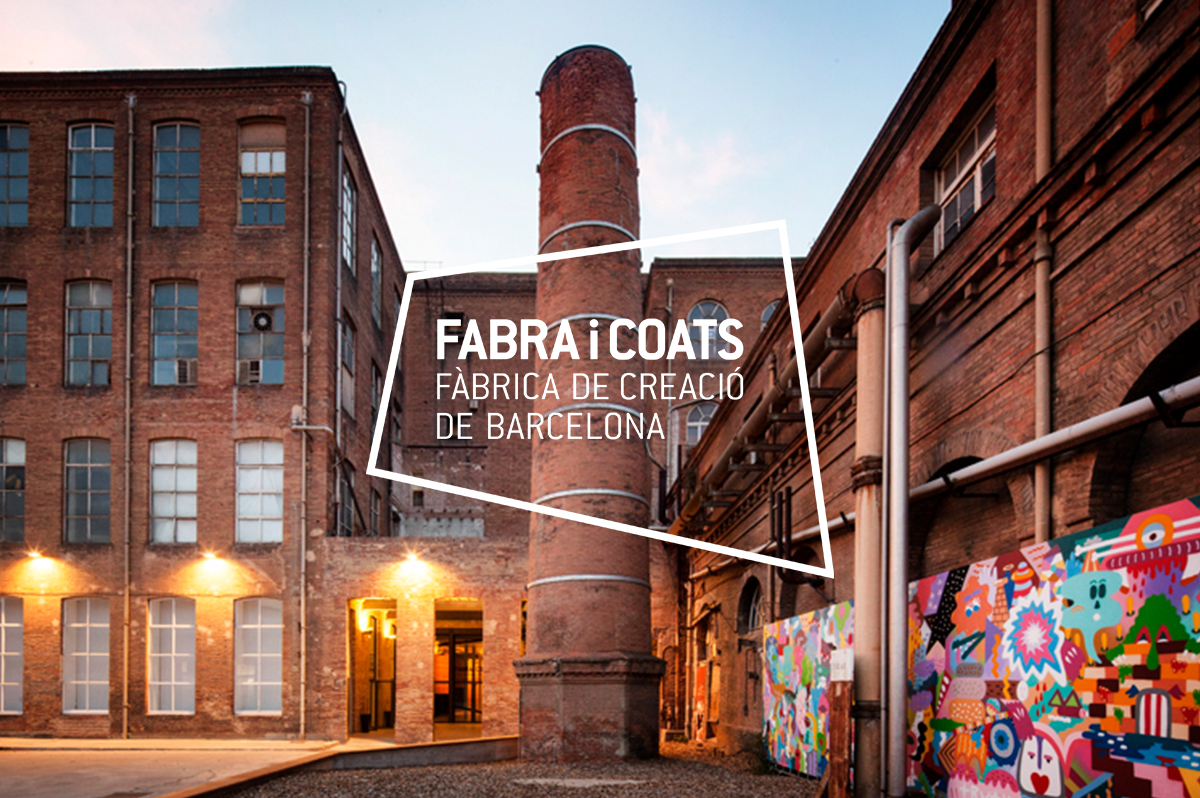
Develop your project in a professional environment that fosters exchange and collaboration with other creators, collectives, associations, and cultural agents. Application deadline: January 17, 2025. Residency start date: February 2025. Check the guidelines at this link.
Additional information
Presentation
Academic year 2025-2026: 25th edition
The UIC Barcelona's University Master's Degree in Cultural Management takes a practical approach and has a strong international outlook. Start your education as a cultural manager and position yourself in an emerging sector which generates jobs involving projects with an international impact.
At UIC Barcelona you will take a comprehensive look at the work processes of cultural services and products from an entrepreneurial perspective. You will look in greater depth into the work dynamics of the two specialisation tracks: visual arts and cultural heritage or creative cultural industries and you will acquire a polyvalent, multidisciplinary profile.
The classes will alternate with study visits, where you will have the opportunity to visit cultural institutions and facilities and learn from the people running them. You will also have access to master classes and workshops given by national and international experts.
* This Master's Degree is an official postgraduate qualification which has been adapted to the European Higher Education Area regulations, with an assessment carried out by the Catalan University Quality Assurance Agency (AQU Catalunya) and the National Evaluation Agency for Quality and Accreditation (ANECA). .
Objectives
The UIC Barcelona gives you the tools you need to become a cultural manager.
The objectives of the master's degree programme include:
- To offer a reflection on the theory of culture in the 21st century and its social effects.
- To provide instruction about the characteristic features of local, national and international cultural policies.
- To teach students how to analyse a society's cultural fabric and prepare a diagnosis of needs and opportunities.
- To ensure students can apply management tools to the subjects of financing, financial management, human resources, marketing, communication, scheduling and production in relation to cultural events.
- To encourage the acquisition of personal entrepreneurial skills.
- To provide instruction about the specific management requirements of each cultural areateach students to evaluate cultural projects and programmes.
- To immerse students in professional reality.
- To introduce students to professional practice.
- To encourage a sense of social responsibility and ethical commitment.
Who It Is Aimed At. Incoming Student Profile
This master's programme is designed particularly for:
- Recent young university graduates who want to receive training as cultural managers.
- Active professionals with several years of experience who want to improve their training in management and management processes and methods.
Students
The Master's Degree in Cultural Management offers the unique experience of an intensive exchange between students from different countries and continents and from different cultures, languages and religions. For the degree, culture comes to life in exchange and through communication. Cultural exchange is not just an academic objective, but a daily reality for each and every student in the classroom and at our Barcelona Campus. This is proven by the more than 900 alums from over 80 different countries that we have trained as cultural managers over the last 20 years.
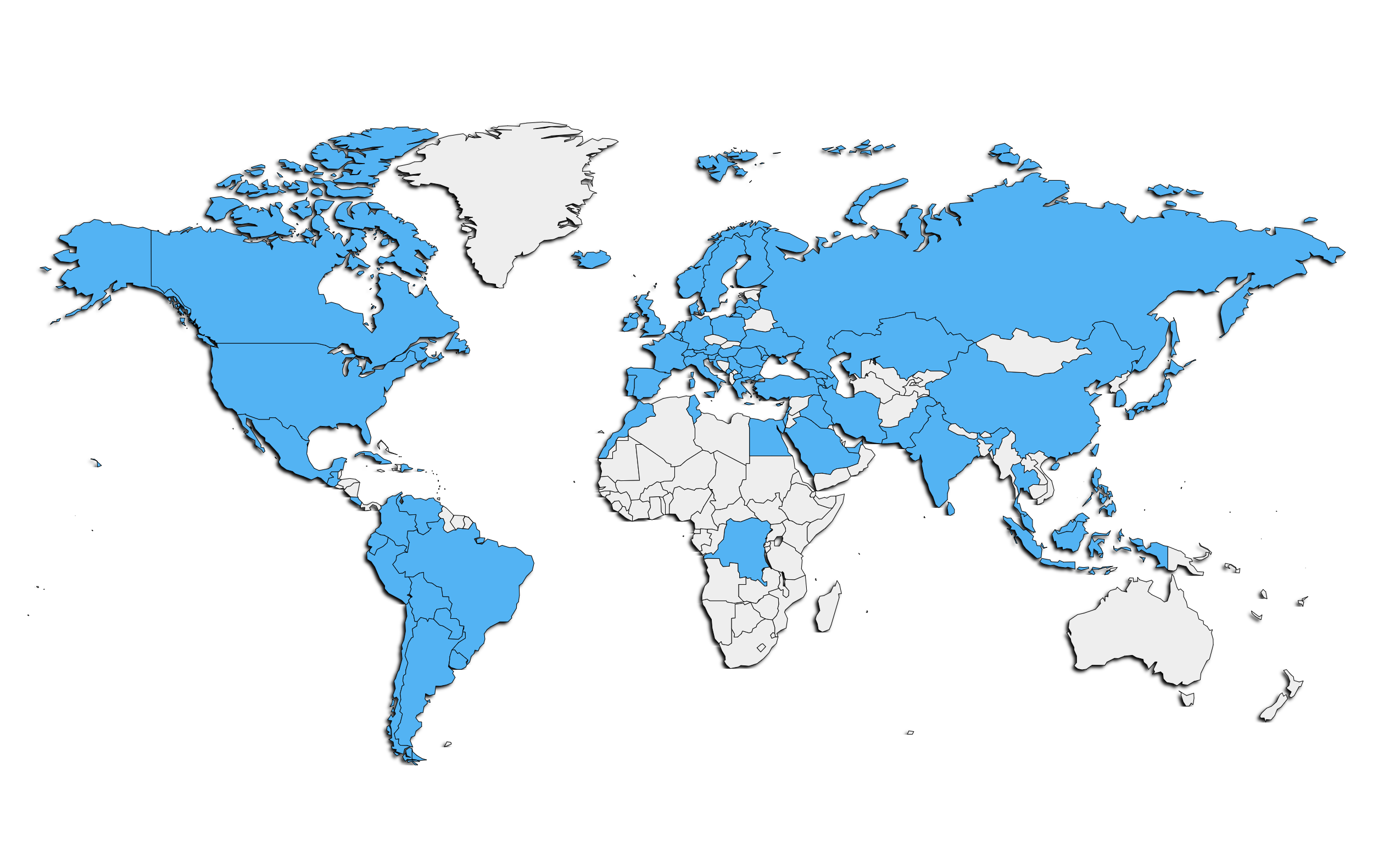
Competencies. Outgoing Profile
It will provide you the skills and competences specific to cultural management, among which the following stand out::
- Analysing a society's cultural fabric and preparing a diagnosis of needs and opportunities.
- Designing, scheduling, managing and assessing cultural projects.
- Creating, managing and leading interdisciplinary human teams.
- Attracting and managing economic resources in relation to cultural projects, companies and institutions.
- Designing marketing and communication strategies in the area of culture.
- Being familiar with and applying new technologies in the process of cultural management, production and dissemination.
- Encouraging a sense of social responsibility and ethical commitment.
Academic accreditation
Máster Universitario en Gestión Cultural por la Universitat Internacional de Catalunya.
Course directors and coordinators
Director
Christoph Pasour
crpasour@uic.es
Degree in Art History and Media Studies from the Freie Universität Berlin (Germany) and also Edinburgh University (UK). TV Producer. He has authored articles for newspapers and magazines on media art and cinematography. He was the project manager and curator at the Museum for Cinematography in Potsdam, Germany; commissioning Editor in the film department of the 3sat cultural television channel (Germany, Austria and Switzerland). He has also been involved in script development (fiction / non-fiction) for production companies in Berlin and Hamburg. He has been a producer/author on documentaries since 2005 for production companies in Berlin, Hamburg and Barcelona for broadcasters such as ARTE, 3sat, ARD, ZDF, RAI, YLE, TV3. He currently is the director of the University Master's Degree in Cultural Management at UIC Barcelona.
Coordination
Claudia Balboa Salas
cbalboa@uic.es
Degree in Conservation and Restoration of Cultural Heritage from the University of the Basque Country and University Master's Degree in Cultural Management from the UIC Barcelona. She has worked as a cultural manager at the Cervantes Institute in Beijing and collaborated with various companies and institutions in the design of cultural projects and exhibitions. She also participated in the conceptualisation of the infrastructure development plan for Langyuan Station in Beijing, to transform this industrial area of Pekin into a space for Culture and Creative Industries the country. After her experience in China she returned in October 2018 to Spain, as director of the Rioja Wine Cultural Centre, a historic building linked to wine tourism. As interim civil servant of the City Council she developed the Master Plan and cultural, social and training programme for the reopening of the facility. In 2020 Claudia established herself as independent cultural consultant and she collaborated with the Langyuan New Times Culture in the definition of the cultural development plan and a new urban space for the Music and Performing Arts in Wuzhen. She also provides services to mono office architecture studio production of artistic projects, such as “I Want to be the Future: The Anatomy of Technological Seduction,” developed together with the Chinese artist Cao Fei, for the Whitechapel Gallery in London and the Alserkal Avenue in Dubai. She currently coordinates the Postgraduate Studies in Cultural Management at UIC Barcelona.
Teachers
Wendy Ramírez Simon
Society and Culture in the 21st century
Dr Wendy R. Simon holds a degree in Political Science by the Universitat Pompeu Fabra and a PhD in Contemporary Philosophy and Classical Studies by the Universitat de Barcelona. She is an associate professor at Universitat Internacional de Catalunya among others. She is also Executive Director of the Universitat Autònoma de Barcelona’s Journal of Catalan Intellectual History (JOCIH) and a member of the Executive Committee of the Anuari de la Societat Catalana de Filosofia of the Institut d’Estudis Catalans (IEC). She is a member of the Institute of Law and Technology (IDT-UAB). Her lines of research include the democratic theory, Modern political philosophy and the crisis of contemporary democracies.
Miguel López-Remiro Forcada
Society and Culture in the 21st Century
He is a graduate in Economy and he holds a PHD in Philosophy from the University of Navarra. He has an MBA from IESE and he is the first Spanish graduate from the Getty Leadership Institute in the Claremont University, Los Angeles. Visiting Scholar and lecturer at University of California, San Diego. Collaborator of the J. Paul Getty Museum, Los Angeles. Deputy Director of the Guggenheim Museum in Bilbao and Founding Director of the Museum of Navarra. He is the editor, with worldwide rights, of the anthology of texts by Mark Rothko, Yale University Press and Flammarion. Lecturer in the area of Arts at the University of Navarra. Lecturer at ISEM business school where he is a researcher on creativity and Management. In parallel he pursues a career as consultant of independent art, economist of culture, artistic entrepreneur and curator of institutions and collections of high prestige.
David Roselló
Cultural Institutions and Policies. Cultural Projects
Director of Nexe Cultural S.L., a company that manages training projects and supports the design and implementation of political and cultural projects. Teacher in courses throughout Spain, Latin American, Europe and Africa. Consultant on numerous studies and strategic plans for culture and cultural projects. Author of the book Diseño y evaluación de proyectos culturales.
Miquel Bastons
Tools for Managing Culture. Funding for Culture
Holder of a PhD in Philosophy from the University of Navarra and a PhD in Business Management from the IESE Business School. Tenured lecturer at UIC Barcelona. Previously dean of the Faculty of Economic and Business Sciences at UIC Barcelona. Author of books and specialised articles about the decision-making process in organisations.
Joaquina Bobes
Cultural Marketing. Cultural Projects
Holder of an undergraduate degree in History, specialising in Pre-History and Archaeology, from the University of Oviedo. Holder of a Master’s Degree in Cultural Management from the University of Barcelona. Executive MBA from the EADA Business School. Postgraduate studies in the Department of Archaeology at Newcastle University (United Kingdom) and in the Department of Cultural Management and Policy at City, University of London (United Kingdom). Founding partner of the consultancy firm ARTImetría, a company specialised in strategic planning and cultural marketing. Since 1998, she has been the company’s general manager and senior consultant. Co-author of Manual de tiendas de museos [Museum Shop Manual] (Trea, 2014).
Antoni Laporte Roselló
Cultural Marketing
Director of ARTImetria, a consulting firm dedicated to planning, managing and evaluating cultural projects. Technical director of the Observatory of the Public of the Cultural Heritage of Catalonia (OPPCC). The OPPCC’s goal is to give support to museums and other heritage institutions as well as to the public administrations and private agents who manage cultural heritage in Catalonia and its relation with the publics to improve the planning and management thanks to research and education. Economist by the Autonomous University of Barcelona. Master in Cultural Management and Politiques by the University of Barcelona.
Cristina Calvet
Legal Aspects of Museums, Foundations and Cultural Institutions
Lawyer specialised in intellectual property rights. For the past 12 years, she has worked as a lawyer in the art and culture sector. She has served as consultant for the Professional Association of Agents, Managers and Promoters of Catalonia (ARC) and at the Barcelona Universal Forum of Cultures as the lawyer assigned to the Department of Show Production. For the past five years, she has worked for the Association of Professional Actors and Directors of Catalonia (AADPC), providing legal advice in the field of the performing arts. As a teacher, she has served as member of the Scientific Committee and lecturer in the Master’s Degree in Intellectual and Industrial Property Rights at the Barcelona Bar Association (ICAB).
Amilcar Vargas
Legal Aspects of Museums, Foundations and Cultural Institutions
Amilcar Vargas holds a PhD from the University of Barcelona and is responsible for World Heritage at Casa Batlló. His main task is the implementation of the World Heritage Convention, raising awareness of the Outstanding Universal Value and pursuing the potential opportunities of Casa Batlló's inscription on the UNESCO List. He is an international expert in World Heritage Management. His international experience includes academic stays in Canada, Germany and Mexico, conference presentations in 13 countries and several publications. He is a member of international professional associations such as ICOMOS and ICOM, among others.
Marc Simon
Legal Aspects of Museums, Foundations and Cultural Institutions
International Doctor cum laude in Intellectual Property Law 12th Extraordinary Doctoral Award from the Department of Law, Pompeu Fabra University, UPF (2020). Master's Degree in Advanced Legal Sciences, UPF. Bachelor's Degree in Law, UPF. Pre-doctoral fellow at AGAUR, DAAD, and the Max Planck Institute in Munich, Germany. Publications in international and Spanish journals specialised in Intellectual Property, such as the International Review of Intellectual and Competition Law, or Pe.i. Revista de Propiedad Intelectual. Author of book chapters (“Transformation Law and New Technologies [El derecho de transformación y las nuevas tecnologías]” in the book Commercial Law and Technology [Derecho Mercantil y Tecnología] for the Aranzadi publishing company, “Transformation of Intellectual Property and Trademark Law [Transformación de obras de propiedad intelectual y derecho de marcas]” for the book Industrial Property Yearbook [Anuario de Propiedad Industrial] for Tirant Publications), and the monograph “Musical creation and copyright (La creación musical y el derecho de autor)” by the Jurua international publishing company, among others. In the teaching field, before joining UIC, he was an associate professor at UPF, the University of Barcelona, UNIR and ESIC. He has professional experience as a lawyer specialising in intellectual and industrial property and competition law.
Isabel Villanueva
Cultural Communication; Leadership, Culture and New Technologies
Isabel Villanueva holds a degree in Audiovisual Communication and Advertising and Public Relations from the University of Navarra. She also has a Higher Degree in Music, with a specialisation in Voice, from the Liceu Higher Conservatory of Music in Barcelona. She recently finished her PhD thesis on “Ópera, Cine y Medios tecnológicos” [Opera, Film and Technological Media]. She is currently vice-dean of the Faculty of Communication Sciences at the Universitat Internacional de Catalunya (UIC Barcelona). Her teaching areas are related to Sound, Music and Film and Media and Film Production. As a professional, she has worked as a producer, scriptwriter and music supervisor for various television channels such as Telecinco and Antena3.
Iliana Ferrer
Cultural Communication
Iliana Ferrer is an associate lecturer for the Department of Audiovisual Communication and Advertising at the Universitat Autónoma de Barcelona, and a project manager at the Templeton communication agency. Social communicator and journalist specialised in media management and production from the Universidad del Norte in Colombia and PhD in Audiovisual Communication from the UAB. She was a postdoctoral researcher at Pompeu Fabra University and the UAB, and a visiting researcher in Dubai, the United States and Mexico. She has also studied film production, training which she has complemented with her experience in the field of audiovisual production, cultural and educational events, teaching and research. She has conducted studies in the fields of information spectacularization, fact-checking, digital media, gender and the implementation of social robots.
Francisco Gil
Creation of Cultural Companies
He holds a Bachelor’s Degree in Philosophy and Letters, a Higher Education Teaching Specialist training degree, a postgraduate degree in Museum Management. He has a master's degree in Educational Research and holds a PhD in Education. Over the course of his career, he has been principal at different educational centres. He was manager of the Chocolate Museum of Barcelona. He is an associate professor at the Universitat Autònoma de Barcelona, ESADE, the UOC, the Universitat Internacional de Catalunya, and the Council on International Educational Exchange. He is currently an advisor to the Aeroclub Barcelona-Sabadell at the Sabadell Airport and managing director of the Centre d’Estudis Stucom in Barcelona. He has published several articles and publications and has been a visiting professor at universities in Peru, Mexico, among others. Member of the Grup de Recerca en Didàctica de les Ciències Socials GREDICS [Social Science Teaching Research Group].
Ramón Castells Ros
Funding for Culture. Leadership, Culture and New Technologies
PhD in Culture and Heritage Management. Degree in Economics and Culture Manager. Researcher in the field of culture industries and cultural funding specialist. Head of the Area of Expertise of the National Council for Culture and the Arts [Consell Nacional de la Cultura i de les Arts] (CoNCA), where he monitors of the development of cultural policies and the Catalan cultural and artistic sectors. Ramon is familiar with using indicators to evaluate national policies and cultural activity. In the education field, he teaches different bachelor’s and master’s degree courses in cultural management on economic viability and cultural project funding.
Clara Laguillo Abbad
Leadership, Culture and New Technologies
(Barcelona, 1984) PhD in Philosophy, specialised in Aesthetics, from the Universitat Autònoma de Barcelona (UAB) in 2018. Her field of research revolves around temporal discomforts in the context of digitisation and the investigation and experimentation of ways of temporalising dissidents.
She is a co-coordinator and teacher of CursO at EINA. Since 2019 she has coordinated the Master’s Degree in Digital Art Curatorship (ESDi-URL) where she also teaches. She also teaches at the Centre for Image and Multimedia Technology (CITM-UPC), and this year she is joining the team of the Master’s Degree in Cultural Management at UIC Barcelona. Over the last two years she has contributed to the website of the Technological Circle of Catalonia (Actualiza’t – FOCUS section), while co-coordinating the quarterly research programme of collective curators, (creating) Situations that takes place at the Centre d’Arts Santa Monica.
She has taught at the UAB (Philosophy, Nanotechnology), at EINA (MURAD), at the University of Barcelona (Fine Arts), in Blanquerna (Ramon Llull University) and at the University of La Plata (Argentina). For over 15 years she has been interested in what it means to curate, especially in digital context formats. She has participated in numerous processes of curating and mediation (CaixaForum), documentation (Joan Miró Foundation), classification (personal archives of artists such as Mercè Boronat and Manolo Laguillo), content programming (Lluïsos Teatre), montage (Foto Colectania Foundation) and cataloguing (Military Museum of Menorca).
Of her wide experience, the cofounding of the Nomade platform in 2012 is a highlight. Art and thought (2012-2015).
Interpersonal care is a main priority of her professional work.
Jordi Padró
Cultural Heritage Management. Cultural Projects.
Holder of an undergraduate degree in Geography and History from the University of Barcelona. Consultant in the fields of heritage, museology and cultural tourism. Founder and director of Stoa, a consultancy firm specialising in heritage, museology and cultural tourism. Lecturer in a number of courses, university postgraduate degrees and seminars on cultural and tourism management and local development. Institutional advisor on cultural and tourism policies, museum programming and production, territorial projects aimed at promoting and educating about cultural and natural resources.
Manel Miró Alaix
Cultural Heritage Management. Cultural Projects.
Graduated in 1985 in Prehistory, Old History and Archaeology from the University of Barcelona. FreelanceI archaeologist from 1989 to 1992. Specialized in 1990 in patrimonial management by the School of Heritage of Barcelona. Since 1998, he is the main consulting àrtner of the Area of Interpretation and Museographic Projects in Stoa. He has directed more than a hundred projects in Spain, Portugal, Morocco and Peru. Lecturer and professor in more than 15 Spanish and Latin American universities. He has published articles about interpreting heritage and museology in different university magazines and he’s the author of the cultural heritage blog ‘Raining Stones’.
Ainhoa González Graupera
Visual Arts Management
Holder of an undergraduate degree in Art History and a Master’s Degree in Museum Studies and Cultural Heritage Management from the University of Barcelona. She has taken courses as part of a PhD in Art History, Theory and Criticism and earned an Advanced Studies Degree. From 2004 to 2016, she worked at MACBA as an assistant curator. She has also worked for companies specialising in the transport of works of art and exhibition assembly and collaborated with galleries and artists.
Valerie Miles
Publishing Industry Management
Valerie Miles, writer, editor and translator, was born in the United States and currently lives in Barcelona. She co-founded British magazine Granta’s Spanish-language project in 2003 whilst managing the publishing house Emecé, part of Grupo Planeta, in Spain. She also established the New York Review of Books’ (NYRB) contemporary classics series in Spanish during her time as associate director of Alfaguara. She has written pieces for The New Yorker, The New York Times, El País, La Nación, The Paris Review and Granta, among other publications. She is currently a Fellow of the National Endowment for the Arts in the United States for her translation of Crematorio by Rafael Chirbes, soon to be published by New Directions, for whom she has also translated works by Enrique Vila-Matas. Her co-translation and extended edition of Juan Eduardo Cirlot's Diccionario de símbolos (A Dictionary of Symbols) will be published by the New York Review of Books in 2020. Her translation of Esto también pasará (This too shall pass) by Milena Busquets was selected as a finalist for the Impac Prize in 2016, as well as receiving the PEN Translation Prize. Her most recent publication from Yale University Press is a study of Nobakov by Azar Nafisi, which gave rise to the author’s best-seller, Reading Lolita in Tehran. Valerie curated the exhibition Bolaño Archive. 1977-2003 at the CCCB in Barcelona, the fruits of extensive research into the writer’s private archives. She is currently involved in the publication and translation of Borges, Adolfo Bioy Casares' monumental memoirs, for the NYRB. Her first book, A Thousand Forests in One Acorn presents a collection of conversations with some of the twentieth century’s most important writers. It was first published in English and later translated into Spanish under the title Mil bosques en una bellota. She a member of Malba Writers Residence’s honorary committee in Buenos Aires, alongside John M. Coetzee, Soledad Costantini, Christian Lund and Jorge Monteleone, and she was named one of the “most influential professionals in publishing” by the El Libro Foundation in Argentina.
José María Sanchis
Performing Arts Management
Jose Maria Sanchis Perales was born in Valencia. He holds a degree in Law from the University of Barcelona, is specialised in international relations and spent three years preparing for the annual national examinations at the Diplomatic Corps. He has been working in the cultural sector since 1998, first at the CCCB in Barcelona and from 1999 at L’Auditori in Barcelona in the technical department. From 2003, he was head of production for Barcelona Symphony Orchestra and worked on productions for Sonar Festival, Primavera Sound and Peralada Festival, among others. He lectures on the master’s degree in Management and Musical Production at the Escola Superior de Música de Catalunya, as well as teaching Performing Arts Management at UIC Barcelona. He also regularly collaborates with different educational institutions such as the IESE Business School, Blanquerna, Pompeu Fabra University, the Universitat Autònoma de Barcelona and the University of Deusto.
Armando Rotondi
Performing Arts Management
Armando Rotondi is an academic, writer, theatre practitioner and cultural manager from Italy. He is Full Professor and Leader of the MA Creative Performance Practice at the IAB – Institute of the Arts Barcelona (validated by Liverpool John Moores University). After a BA at the Federico II University of Naples and a 2-year MA at the Sapienza University of Rome, he achieved his PhD at the University of Strathclyde in 2012. He also gained 3 university professorship habilitations. Armando is author of several academic publications: more than 10 authored and edited books; more than 50 book chapters and articles in peer-reviewed journals; more than 50 papers at international conferences, including 4 papers as a keynote speaker and on many chairs of expert panels. He is a founding member of INIT – International Network of Italian Theatre and a member of the Executive Committee of the European Association for the Study of Theatre and Performance. In addition, he is a member of many editorial boards and boards of trustees. Armando is also active in the field of European and international research project and grants. He was Project Co-Manager of the Creative Europe “Make a Move” project on art incubators for independent and non-institutionalised theatre in Europe at the IAB and is currently co-organiser of the EASTAP Conference 2024.
Christoph Pasour
Audiovisual Industry Management
Mr Pasour is a TV Producer. He holds a degree in Art History and Media Studies from the Freie Universität Berlin (Germany) and also Edinburgh University (UK). He has authored articles for newspapers and magazines on media art and cinematography. He was the project manager and curator at the Museum for Cinematography in Potsdam, Germany; commissioning Editor in the film department of the 3sat cultural television channel (Germany/Austria/Switzerland). He has also been involved in script development (fiction/non-fiction) for production companies in Berlin and Hamburg. He has been a producer/author on documentaries since 2005 for production companies in Berlin, Hamburg and Barcelona for broadcasters such as ARTE, 3sat, ARD, ZDF, RAI, YLE, TV3. He currently is the director of the University Master's Degree in Cultural Management at UIC Barcelona.
Senem Tüzen
Audiovisual Industry Management
Senem Tüzen, born in Ankara and citizen of Spain, wrote and directed the Turkish mother - daughter drama Motherland (Ana Yurdu)—, her first feature film, —which premiered at the 2015 Venice Critics' Week. The film has, won 18 national awards, as well as Best Screenplay at the 2015 Asia-Pacific Awards, two FIPRESCI awards (Warsaw and Istanbul) and was among the ten films proposed by FIPRESCI for the 2016 European Film Awards. She co-directed the narrative documentary Eat Your Catfish (2021), which premiered in competition at IDFA and won Best Documentary at the Istanbul Film Festival. She wais also one of six international finalists for the 2022 Academy Gold Fellowship for Women, given awarded by the Academy of Motion Picture Arts and Sciences. Previously, she has contributed to various film and televisioón projects, —including Al Jazeera and Turkish state television productions—, as a producer, editor and director of photography. She also worked as a script doctor for the Turkish series "Another Self" (2022 - 2023) on Netflix. Currently, she is a profesor lecturer in the 'Master’s Degree in Film Directing' at ESCAC.
Marta Crispí
Cultural Project. Academic tutor external internships
PhD in Art History. Professor of the Bachelor’s Degree in Humanities at UIC and director of the University Master's Degree in Arts and Cultural Management (2012-2021). Her research focuses on issues of artistic heritage, cultural management, medieval art, iconography. Marta has directed or participated in research projects such as: Changes in cultural management in a post-COVID-19 Catalonia: from on-site to online, [Els canvis en la gestió de la cultura a Catalunya post-COVID-19. De la presencialitat a la virtualitat] (UIC, 2020-2022); Analysis, evaluation of the temporary exhibitions (CaixaForum Foundation 2009-2018); Creation of content and dynamisation of the Cathedral of Vic (Vic Bishopric, 2017-2019), etc. Marta has published articles in international journals and is responsible for editing books such as: Cultural Leadership in Transition Tourism. Developing Innovative and Sustainable Models, ed. Elena Borin, Mara Cerquetti, Marta Crispí and Judith Urbano. Springer 2022; The Cathedral of Saint Peter of Vic (La catedral de Sant Pere de Vic), ed. M. Crispí, S. Fuentes, J. Urbano, l’Abadia de Montserrat publishing company, 2019; and Monastery of Sant Joan de les Abadesses (El monestir de Sant Joan de les Abadesses), ed. M. Crispí and M. Montraveta, 2012.
Claudia Balboa Salas
External Work Placement Coordinator
Degree in Conservation and Restoration of Cultural Heritage from the University of the Basque Country (2014) and University Master's Degree in Cultural Management from the Universitat Internacional de Catalunya (2015). She has worked as a cultural manager at the Cervantes Institute in Beijing and collaborated with various companies and institutions in the design of cultural projects and exhibitions. She also participated in the conceptualisation of the infrastructure development plan for Langyuan Station in Beijing, to transform this industrial area of Pekin into a space for Culture and Creative Industries in the country. After her experience in China she returned in October 2018 to Spain, as director of the Rioja Wine Cultural Centre, a historic building linked to wine tourism. As interim civil servant of the City Council she developed the Master Plan and cultural, social and training programme for the reopening of the facility. In 2020 Claudia established herself as independent cultural consultant and she collaborated with the Langyuan New Times Culture in the definition of the cultural development plan and a new urban space for the Music and Performing Arts in Wuzhen. She also provides services to mono office architecture studio production of artistic projects, such as “I Want to be the Future: The Anatomy of Technological Seduction,” developed together with the Chinese artist Cao Fei, for the Whitechapel Gallery in London and the Alserkal Avenue in Dubai. She currently coordinates the Postgraduate Studies in Cultural Management at UIC Barcelona.
Federica Matelli
Society and Culture in the 21st Century
Researcher, teacher and curator. She holds a doctorate in Society and Culture (speciality: Theory and History of Contemporary Art) from the University of Barcelona. Master's Degree in Curating and Cultural Practices in Art and New Media by ESDI and Ramón Llull University, organised by MECAD, Media Centre of Art and Design and holds a Bachelor’s Degree in Philosophy from the University of Pisa (Italy). She is also a professor of "Modern Thought and Artistic Practices" at the BAU Fine Arts Degree. College of Arts and Design Barcelona. She is part of the research team of the R&D project Visuality and Geoaesthetics in the Era of the Ecosocial Crisis. Analytical Approaches (VIGEO) of the AGI research group. Art, Globalisation and Interculturality (UB), and the GREDITS work team. Research Group in Design and Social Transformation (BAU). From an interdisciplinary approach, her research proposes the study of artistic practice in connection with other disciplines such as philosophy, sociology and cultural studies. Her doctoral thesis has resulted in 10 publications in seven years and three exhibition projects. She has participated in numerous national and international congresses. She has carried out research for public and private art bodies and has published essays, scientific and critical articles. She has also disseminated her research internationally through curatorship. She is the author of the publication entitled Ciutat. El futur no té data, which contains the results of the project of the same name carried out in ESPAI 2 of the Sala Muncunill during 2021 and published by Terrassa Arts Visuals. Her book has won one of the prestigious ADG Laus Graphic Design and Visual Communication Awards and the ADC*E Europe International Design and Advertising Award. Recently, her curatorial project 7642. Siempre estaré para ti was selected among the 146 submitted to the next edition of Temporals (2025-2026), the travelling contemporary art programme organised by Barcelona City Council (ICUB. Barcelona Institute of Culture).
Internship
Work placements are one of the pillars of the University Master’s Degree in Cultural Management’s curriculum, because they facilitate the students’ integration into a cultural company or institution, enable them to apply their knowledge and help them develop the professional competences a cultural manager requires. Curricular work placements are compulsory and are worth 12 ECTS. They are preferably done on-site.
What’s more, as a Cultural Management master’s student, you have access to the ERASMUS+ programme managed by the University's International Relations Service, and qualify for financial aid to do a work placement abroad either as a student or a recent graduate.
Educational Cooperation Agreements for External Work Placements
The UIC Barcelona Faculty of Humanities has an extensive work placement programme covering more than 400 cultural entities, companies and institutions at the local, national and international level.
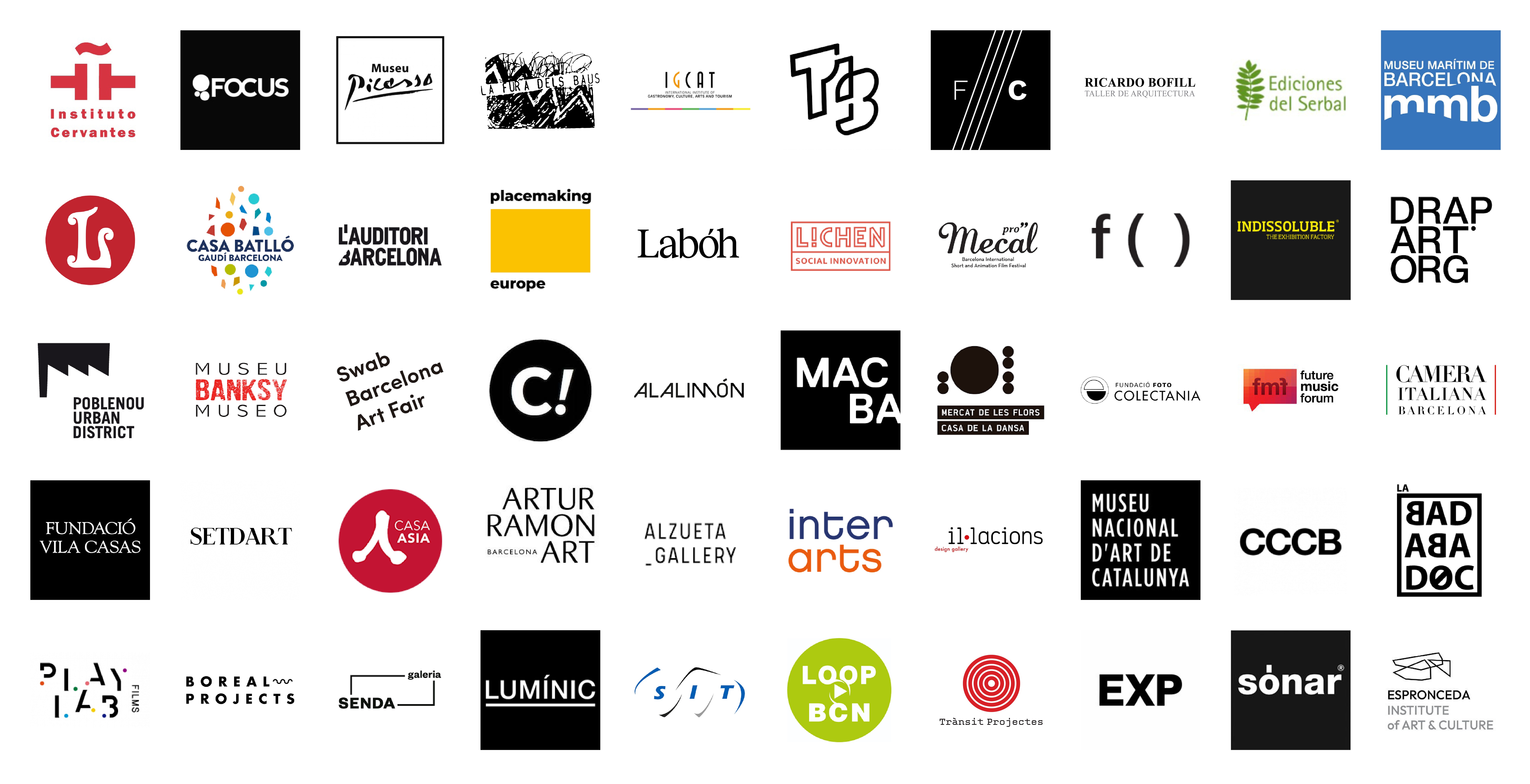
If you want to offer a work placement to students or recent graduates, please send an email to cbalboa@uic.es with your proposal.
Objectives
- Learn how an entity or company that offers cultural products or services works.
- Learn the overall process of executing a cultural product or cultural service.
- Become part of a work team and learn the work dynamics of the company or institution.
- Manage one aspect or part of the project or service according to previously set objectives.
- Develop initiative and responsibility in professional practice.
- Analyse and reflect on the work experience, make a critical assessment of the work carried out.
The academic tutor and the degree programme’s work placement coordinator will ensure that each student’s work plan is related to the objectives and competences the students should acquire.
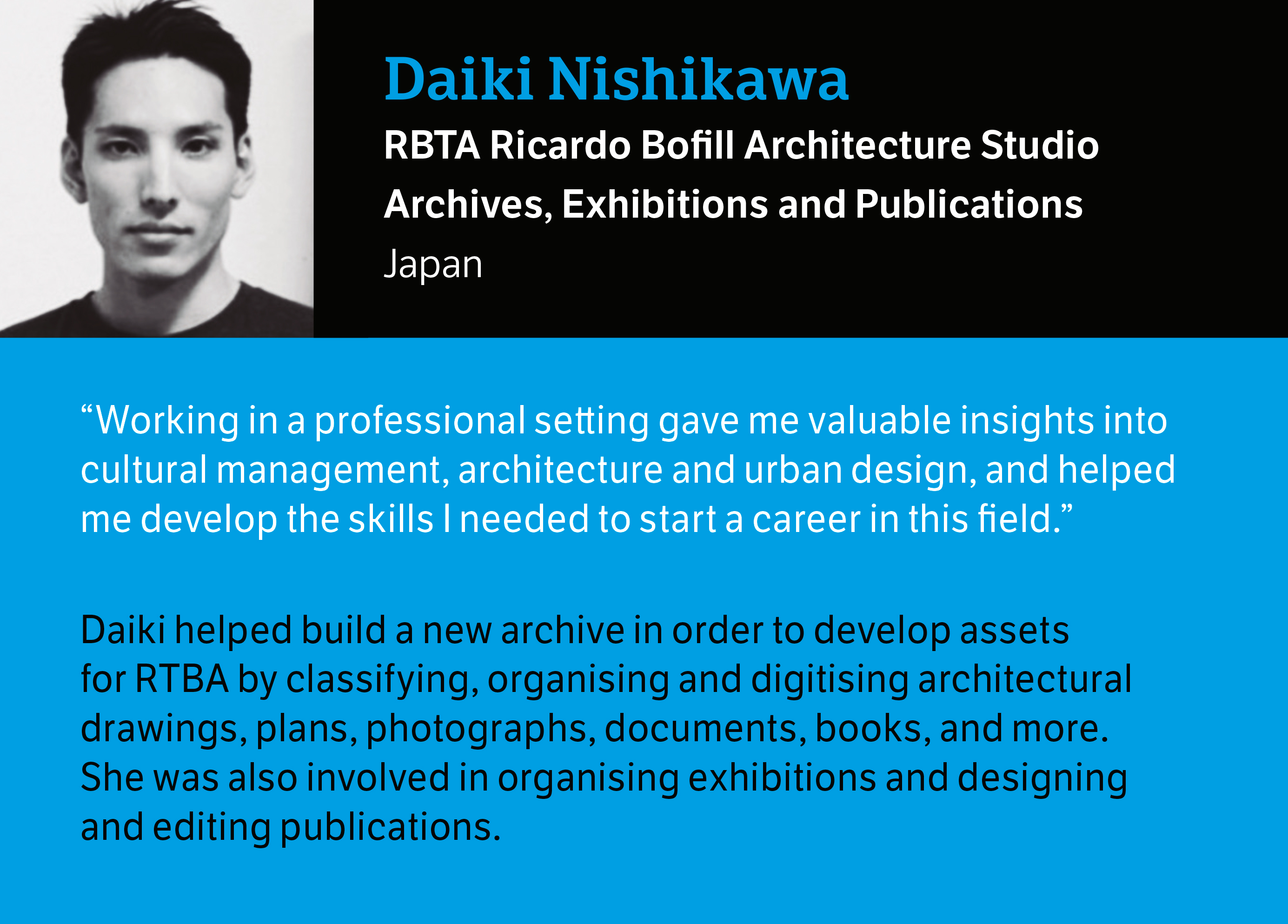 | 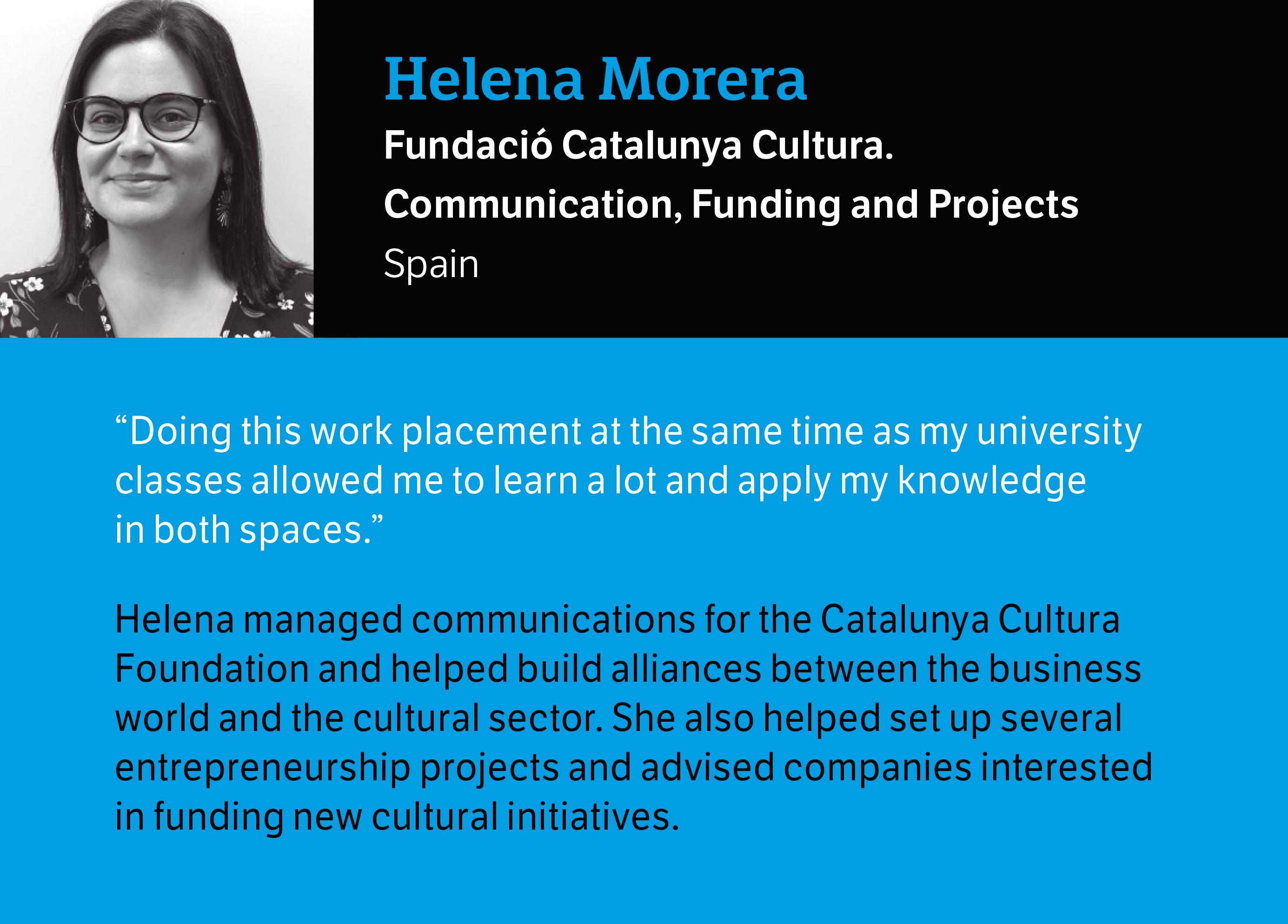 |
Regulations
Professional opportunities
UIC Barcelona's commitment is to provide students with the best possible academic preparation. This includes placing appropriate instruments at the student’s disposal that will facilitate their work placement.
University Master's Degree in Cultural Management graduates acquire the skills necessary to work in the following fields:
- Management of cultural services or projects in the public sphere (on a local, provincial, regional or state level) or for public-private bodies: public authorities, museums, theatres, cultural centres, multicultural facilities, etc.
- Management of private companies that offer cultural services or products: film production companies; companies that design online cultural content; companies that manage heritage promotion projects; art galleries; foundations; companies that promote cultural tourism; theatre, film and dance festival production companies; companies or NGOs engaged in international cultural cooperation, etc.
Admission calls
Open Day
UIC Barcelona is opening its doors to the world. The University is organizing open days for future university students who want to learn about our Institution, as well as the master’s degree and postgraduate programmes we offer.
Information sessions
If you want to know in detail the study plan of this master's program and the most in-demand career opportunities currently, join the next information session led by Christoph Pasour, academic director of the Master's Degree in Cultural Management, and Claudia Balboa, coordinator of the Postgraduate Studies in Cultural Management and Professional Practices at UIC Barcelona.
Upcoming online information sessions:
- Wednesday, November 20, 2024 at 6:30 p.m.
- Monday, January 27, 2025 at 6:00 p.m.
- Tuesday, March 4, 2025 at 6:00 p.m.
- Tuesday, May 27, 2025 at 6:30 p.m.
Registration through this link.
Admission calendar and calls
The admission application period for the Master's Degree in Cultural Management (2025/2026 academic year) will be open until June 30, 2025.
From the opening of the application submission period, the Management and Coordination of the Master will carry out the interviews and will progressively decide on the admission of the candidates. Candidates interested in taking the Master's Degree may submit the admission application online even if they have not yet completed their studies, provided that before the start of the course documents proving the required qualification must be submitted they present documents proving that they have the required qualification.
For more information, contact Carlos Campos, Admissions Advisor for the Master’s Degree: ccamposa@uic.es
Prerequisites & admissions
Entrance Examinations
Specialised entrance exam, once all required documentation has been received and approved.
Required documentation
Information about the documents required for admission to the Master's Degree in Arts and Cultural Management may be found by clicking on the following link:
Admission criteria
While all candidates who meet the access route requirements will be considered, acceptance will be determined based on the following criteria:
- Personal academic transcript of the earned degree
- Professional and academic CV
- Admission test
- Personal interview
Reservation and enrolment
Access routes
Information about the access routes for the Master’s Degree in Arts and Cultural Management may be found by clicking on the following link:
Grants & financial aid
Grants offered by UIC Barcelona for master's and postgraduate degrees
Other grants
Financial aid
The UIC Barcelona offers the possibility of payment in installments to study for the Master's Degree in Arts and Cultural Management as indicated below:
- 20% of the tuition fee within 15 days after obtaining admission
- 20% in the 10days following the moment in which registration has been formalized
- 20% before November 30
- 20% before January 31
- 20% before March 31
Faqs
Master's Degree
-
What are ECTS credits?
ECTS (European Credit Transfer System) credits are the units used to quantify all the activities the students carry out during the learning process: theoretical and practical class hours, study hours, seminars, homework, work experience and projects, exam preparation and exams or other tests. Each ECTS credit is equal to 25 hours of work. -
What is an Official Master’s Degree?
An Official Master’s Degree is a postgraduate qualification that is valid throughout Spain and in all European Union countries that are part of the European Higher Education Area (EHEA). To gain access, participants must hold an undergraduate degree, diploma or equivalent or bachelor’s degree awarded under the new higher education system.The University Master’s Degree in Cultural Management at UIC Barcelona is an official postgraduate qualification that has been adapted to European Higher Education Area regulations and whose quality has been evaluated by the Catalan University Quality Assurance Agency (AQU Catalunya) and the Spanish National Evaluation Agency for Quality and Accreditation (ANECA).
-
What is the difference between the Master’s and postgraduate degrees in Cultural Management, Museum and Cultural Heritage Management and Cultural Industry Management?
The University Master’s Degree in Cultural Management at UIC Barcelona has a heavier course load and workload. As a result, it provides a more comprehensive overview of cultural management and also includes a Final Master’s Degree Project and work experience.The postgraduate degrees, thanks to their reduced format, are a great option for people who work and study or who are taking other courses. They are intended for students with a bachelor's degree, undergraduate degree or diploma, who are currently working and who wish to further their knowledge of key aspects of cultural management. The subjects that make up the curricula of the various postgraduate degrees are also part of the Master’s Degree curriculum.
The University Master's Degree in Cultural Management at UIC Barcelona is an official postgraduate qualification adapted to the regulations of the European Higher Education Area. Postgraduate degrees are, throughout the EU, specific to the universities that teach them.
-
Is work placement compulsory? Can I have my professional experience recognised?
Work experience is one of the pillars of the University Master’s Degree in Cultural Management’s curriculum, as it facilitates students’ integration into a company or cultural institution, enables them to apply the knowledge they acquire during the academic year and helps them develop the professional competences required of a cultural manager.Work placement is compulsory. It is worth 12 credits and is equivalent to approximately 250 / 300 practical hours, which may be completed during the academic year or over the summer (before the end of November). In Spain, work placement is usually unpaid.
-
Do I need to speak Spanish or Catalan to do work placement in Catalonia?
The official languages of Catalonia are Catalan and Spanish, though the vehicular language of public institutions is primarily Catalan. UIC Barcelona recommends that you have knowledge of and learn both languages. Students interested in doing work placement in Catalonia must acquire at least a B2 level of Spanish between October and January of the year they take the Master’s Degree. Otherwise, the coordinators of the University Master’s Degree in Cultural Management will be unable to guarantee you a work placement agreement in Catalonia.UIC Barcelona, through the Institute for Multilingualism, offers both on-site and online Spanish and Catalan courses outside the Master’s Degree timetable.
-
If I enrol in the Spanish edition of the Master’s Degree, can I still choose optional subjects from the Master’s Degree in English and vice versa?
Students may choose three optional subjects, regardless of whether they correspond to the Spanish or English edition. These subjects may not be chosen in the event they occur on the same date and time.
Alumni Ambassadors
Meet our Alumni Ambassadors
Alumni Ambassadors are former students who have volunteered to talk about their experience at UIC Barcelona. With them you can address any doubts about your chosen studies, the university and the student experience.
